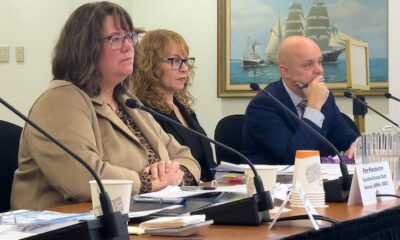Politics
NDP Proposes 72-Hour Detention Bill for Substance Intoxication

WINNIPEG — The NDP government has introduced legislation aimed at addressing public safety concerns related to substance intoxication. On October 26, 2023, they unveiled Bill 48, known as the Protective Detention and Care of Intoxicated Persons Act, which seeks to allow for the 72-hour involuntary detention of individuals under the influence of substances like methamphetamine.
The proposed bill is a significant shift from current laws, which permit only 24-hour detentions for individuals intoxicated with alcohol. Housing, Addictions and Homelessness Minister Bernadette Smith emphasized that the new legislation is intended to enhance public safety and provide necessary support for those struggling with addiction. “I look forward to quick passage of this bill and unanimous support from this house,” Smith stated in the legislative assembly, highlighting the need to relieve pressure on police and emergency services.
Key Changes and Rationale Behind the Legislation
The bill expands the scope of involuntary holds, allowing authorities to detain individuals for up to 72 hours. This extended period is based on expert recommendations that individuals under the influence of certain drugs may require more time to achieve sobriety. Smith noted that current protocols often force police to choose between criminalizing individuals or transporting them to hospitals, where they face long wait times for care.
“They’re often handcuffed to a chair or a bed for their own safety and the safety of others,” Smith remarked during a news conference alongside Winnipeg Police Service Chief Gene Bowers. The chief supported the legislation, stating, “Currently, our members have very limited options when it comes to people suffering from meth psychosis.” He indicated that police officers frequently spend considerable time with individuals in distress, which strains resources and limits their capacity to respond to other emergencies.
Concerns and Questions from Opposition Parties
Despite the NDP’s push for swift passage, the opposition Progressive Conservatives have raised numerous questions regarding the practical implementation of the bill. PC Leader Obby Khan expressed concerns about the locations of the proposed protective care centres, questioning whether existing facilities, such as the Health Sciences Centre, could accommodate the new requirements. He also queried the government’s commitment to discussing the bill with opposition members prior to its introduction.
Khan’s inquiries touch on broader concerns about the effectiveness of the bill in preventing a cycle of addiction. “If this is a priority and you want to work together to pass this, why not sit with the other votes in the house and say, ‘How do we get this across the finish line?’” he questioned, emphasizing the need for collaboration in addressing such a critical issue.
In response to concerns about the readiness of existing facilities to manage the longer detention times, Smith assured that the necessary resources would be allocated to ensure the bill’s effective implementation. “This is taking pressures off the system but it’s also connecting people to care that they need,” she stated.
As the legislative session approaches its conclusion in November, it remains uncertain whether the NDP can secure the bipartisan support necessary for prompt passage of Bill 48. The outcome of this legislative effort will be closely monitored by stakeholders across Manitoba, who are keen to see how the government balances public safety, health care needs, and community resources in dealing with substance abuse issues.
-

 Politics4 weeks ago
Politics4 weeks agoSecwepemc First Nation Seeks Aboriginal Title Over Kamloops Area
-

 World5 months ago
World5 months agoScientists Unearth Ancient Antarctic Ice to Unlock Climate Secrets
-

 Entertainment5 months ago
Entertainment5 months agoTrump and McCormick to Announce $70 Billion Energy Investments
-

 Science5 months ago
Science5 months agoFour Astronauts Return to Earth After International Space Station Mission
-

 Lifestyle5 months ago
Lifestyle5 months agoTransLink Launches Food Truck Program to Boost Revenue in Vancouver
-

 Technology3 months ago
Technology3 months agoApple Notes Enhances Functionality with Markdown Support in macOS 26
-

 Lifestyle3 months ago
Lifestyle3 months agoManitoba’s Burger Champion Shines Again Amid Dining Innovations
-

 Top Stories2 months ago
Top Stories2 months agoUrgent Update: Fatal Crash on Highway 99 Claims Life of Pitt Meadows Man
-

 Politics4 months ago
Politics4 months agoUkrainian Tennis Star Elina Svitolina Faces Death Threats Online
-

 Sports5 months ago
Sports5 months agoSearch Underway for Missing Hunter Amid Hokkaido Bear Emergency
-

 Politics5 months ago
Politics5 months agoCarney Engages First Nations Leaders at Development Law Summit
-

 Technology5 months ago
Technology5 months agoFrosthaven Launches Early Access on July 31, 2025



















